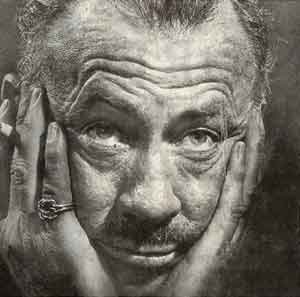|
John Steinbeck
|
||
|
"He is charged with exposing our
many grievous faults and failures, with dredging up to the light our dark and
dangerous dreams, for the purpose of improvement."
John Ernest Steinbeck
(1902-1968), American author and
winner of the
Nobel Prize in 1962,
built his career on stories based in Northern and Central California
around his hometown of Salinas.
John Steinbeck was born on February 27, 1902, in Salinas, California. Steinbeck was the son of a local politician and schoolteacher. He worked as a laboratory assistant and farm laborer to support himself through six years of study at Stanford University as a marine biology major. Steinbeck left without completing his degree. In 1925, he traveled to New York then
back to California on a freighter collecting information for his
writings. His early works, Cup of Gold (1929), Pastures of Heaven
(1932), and To A God Unknown (1933), went unnoticed until the
publication of Tortilla Flats (1935), which described the
abuse
of a group of Mexican-Americans living in Monterey. Steinbeck's
novel Of Mice and Men (1937) was produced concurrently as a play
and a novel. The play received the Drama Critics' Circle Award, and the novel of
two farm hands grounded Steinbeck as a major writer. In his acceptance speech for the Nobel Prize, Steinbeck described his work as a power to improve the condition of humankind. Prior to the speech, R. Sandler, Member of the Royal Academy of Sciences, commented, "Mr. John Steinbeck - In your writings, crowned with popular success in many countries, you have been a bold observer of human behavior in both tragic and comic situations. This you have described to the reading public of the entire world with vigor and realism. Your Travels with Charley is not only a search for but also a revelation of America, as you yourself say: ‹This monster of a land, this mightiest of nations, this spawn of the future turns out to be the macrocosm of microcosm me.› Thanks to your instinct for what is genuinely American you stand out as a true representative of American life."
Source: Banquet Speech. Retrieved from the World Wide Web, 4 August 2008, http://nobelprize.org/nobel_prizes/literature/laureates/1962/steinbeck-speech.html
|
||
|
Please contact Vanessa Bass
for
further information about this site.
|
||

